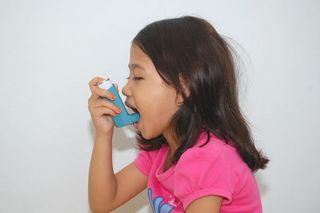Babies' Gut Bacteria May Signal Later Asthma Risk

Infants who lack certain types of gut bacteria in the first few months of life may be at increased risk for asthma when they're older, a new study from Canada suggests.
In the study, researchers examined the gut bacteria of more than 300 infants when they were 3 months old. Those who had low levels of four specific types of gut bacteria were much more likely to be diagnosed with asthma at age 3 than were infants who had normal levels of these gut bacteria. The four bacteria are Faecalibacterium, Lachnospira, Veillonella and Rothia, which the researchers combined into the acronym FLVR.
What's more, in a mouse study, animals that had low levels of the FLVR bacteria developed airway inflammation, but this symptom was reduced when the researchers gave the mice supplements of these four bacteria.
The findings suggest that disturbances in these gut bacteria may play a role in the development of asthma, and that providing infants with certain types of "good" bacteria, known as probiotics, at the right time in life, may reduce these babies' risk of the disease, the researchers said.
"This discovery gives us new potential ways to prevent this disease that is life-threatening for many children," study co-author Dr. Stuart Turvey, pediatric immunologist at British Columbia Children's Hospital in Vancouver, said in a statement. "It shows there's a short, maybe 100-day window, for giving babies therapeutic interventions to protect against asthma," Turvey said. [5 Ways Gut Bacteria Affect Your Health]
However, much more research needs to be done before doctors could recommend that probiotics be given to babies to prevent asthma. First, the researchers need to confirm their results in larger and more diverse groups of children. Then, the scientists need to determine which microbes would be best for a probiotic therapy, and whether such a treatment would be safe and effective, the researchers said.
But in the meantime, Turvey said, doctors could sequence infants' gut bacteria by analyzing the babies' stool, and for infants who are found to have low levels of FLVR, doctors should follow them closely and treat them more quickly if they develop asthma.
Sign up for the Live Science daily newsletter now
Get the world’s most fascinating discoveries delivered straight to your inbox.
In the study, the researchers looked at a group of children living in several cities in Canada who were taking part in an ongoing study about asthma. The researchers examined the children at age 1 for certain symptoms of asthma, including episodes of wheezing, or a positive skin reaction on an allergy test, a reaction known as atopy.
Of the infants in the study, 136 had episodes of wheezing, 87 had atopy, 22 had both atopy and episodes of wheezing, and 74 did not have either of these symptoms.
Children who had both wheezing and atopy were 21 times more likely to be diagnosed with asthma at age 3, as compared to children in the group without either of these symptoms. Children in the wheezing and atopy group were also four to five times more likely to be diagnosed with asthma at age 3 than were the children who had only atopy, or only wheezing.
However, all 22 children who had both atopy and wheezing at age 1 had low levels of FLVR when they were 3 months old, whereas the children without these symptoms had much higher levels of these four bacteria at that age, said study researcher B. Brett Finlay, a microbiologist at the University of British Columbia.
By age 1 year, these differences in gut bacteria were less apparent, "suggesting that therapeutic interventions to address microbial [changes] would need to occur very early in life," the researchers said.
It's not clear exactly why some children have low levels of FLVR, but factors that might alter the composition of an infant's gut include the use of antibiotics, delivery by Cesarean section and consuming formula instead of breast milk, the researchers said.
Michael Bailey, of the Center for Microbial Pathogenesis at Nationwide Children’s Hospital in Ohio, who was not involved in the study, said that the new finding "supports the idea that the normal development of gut microbes is really important for overall health."
Although antibiotic treatments can be very important treatments for infants who are ill, "we really do need to use them only when they're really indicated," because they can disturb the gut microbes, Bailey said.
More research is also needed to better understand the normal process by which bacteria occupy the gut, and where these bacteria come from — for instance, whether they are passed from mother to child, or come from the food people eat, Bailey said. Then, it may be possible to make other recommendations on how to prevent the reduction of these normal bacteria, he said.
The authors have filed for a patent for gut bacteria that could detect or prevent asthma, which would be owned by the University of British Columbia.
Follow Rachael Rettner @RachaelRettner. Follow Live Science @livescience, Facebook & Google+. Original article on Live Science.

Rachael is a Live Science contributor, and was a former channel editor and senior writer for Live Science between 2010 and 2022. She has a master's degree in journalism from New York University's Science, Health and Environmental Reporting Program. She also holds a B.S. in molecular biology and an M.S. in biology from the University of California, San Diego. Her work has appeared in Scienceline, The Washington Post and Scientific American.
